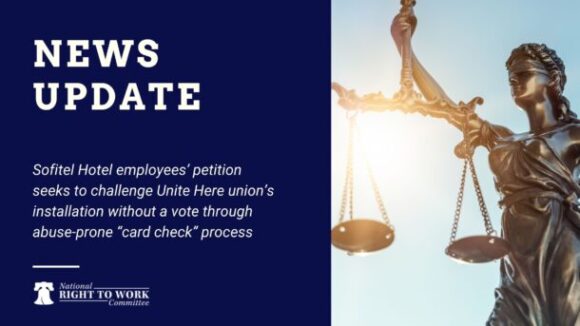Foundation Fires Back Against Biden NLRB ‘Card Check’ Mandate
Brief challenges Labor Board’s attempt to expand coercive, anti-employee organizing scheme
National Right to Work President Mark Mix takes on the outright distortions by opponents of Right to Work in Indiana:
Not surprisingly, it angers Big Labor that Indiana elected officials may soon seriously consider stripping the state’s union officials of their government-granted privilege to force employees, including union members and nonmembers alike, to pay tribute to their union monopoly-bargaining agent just to keep their jobs.
In their anger, union bosses are displaying a near-total disregard for the facts. In one remarkable example, the hierarchy of the Indiana AFL-CIO has posted on its website a screed insisting state right-to-work legislation is not necessary, because “federal law already protects workers who don’t want to join a union to get or keep their jobs.”
In reality, federal law specifically authorizes union contracts forcing workers who don’t want to join a union to pay dues or fees that can be as high as full union dues, or be fired from their jobs. Technically, such workers haven’t “joined” the union. But how significant is that?
If federal law permitted you to join a union over your employer’s objection, but not to pay dues if the employer objected, then would your right to join a union really be protected by the law? Labor-law specialists and the man on the street understand that would not constitute genuine protection. Similarly, the right not to join a union isn’t truly protected by current federal law.
Federal law specifically authorizes contracts telling workers they do have to join a union within a few weeks after they get the job. And the overwhelming majority of private-sector union contracts in non-right-to-work states declare baldly that new hires have to become union “members.”
Current law in Indiana and other non-right-to-work states helps Big Labor mislead millions of workers into believing they have to join the union flat out, or be fired. If federal law actually included provisions protecting the individual employee’s freedom not to join, union lobbyists would be clamoring for their removal.
One falsehood by Indiana AFL-CIO bigwigs is their claim that unions “must represent all eligible employees, whether they pay dues or not.” That’s simply not true. Under both federal and state law, union officials have always had the option to negotiate “members-only” contracts with employers that do not affect the terms of employment of workers who do not wish to join or pay dues to a union.
However, union officials virtually always eschew their members-only option, and instead focus efforts on obtaining recognition from the employer as the monopoly-bargaining agent of all the employees in a so-called “bargaining unit.”
Of course, monopoly bargaining paves the way for forced union dues and fees. But the fact that it is legal does not give union bosses the right to disregard the fact that members-only bargaining is also legal.
Misrepresentations, misdirection and misstatements are not a legitimate part of any public debate over whether Indiana should enact a right-to-work law.
Brief challenges Labor Board’s attempt to expand coercive, anti-employee organizing scheme

Josh Hawley distances himself from pro-Right to Work pledges, aligning with union bosses like the Teamsters, despite their history of corruption.

Sofitel Hotel employees’ petition seeks to challenge Unite Here union’s installation without a vote through abuse-prone “card check” process